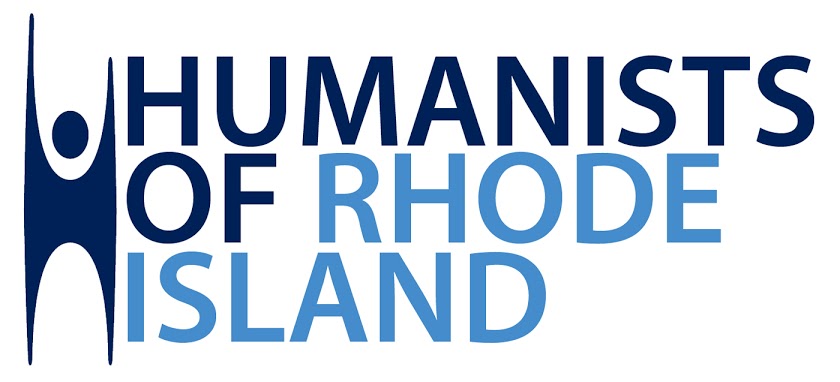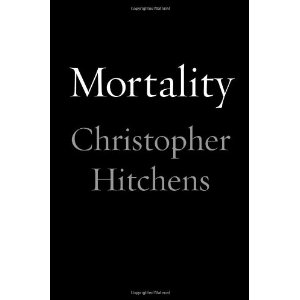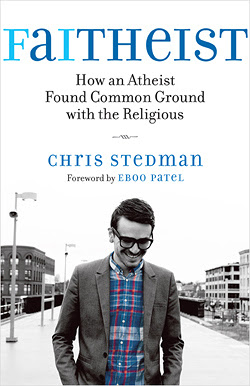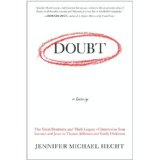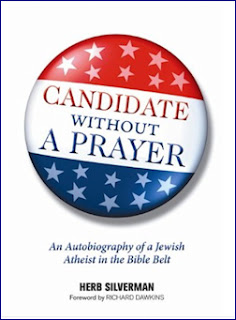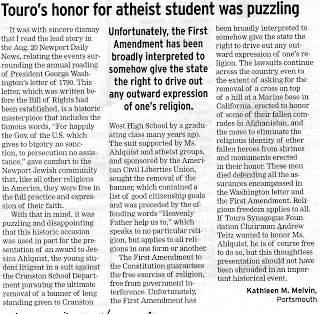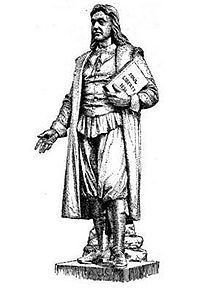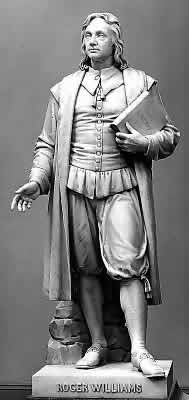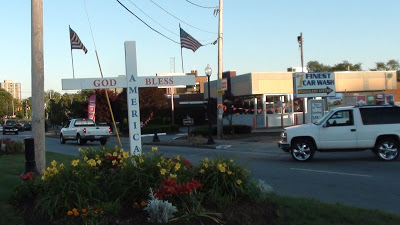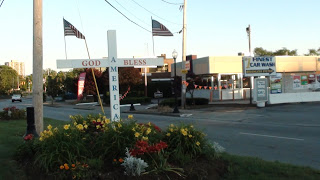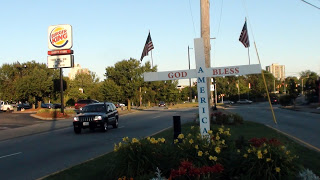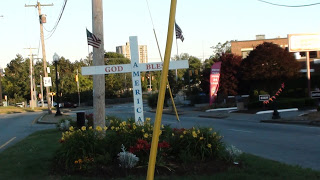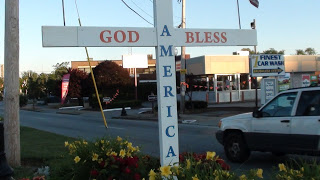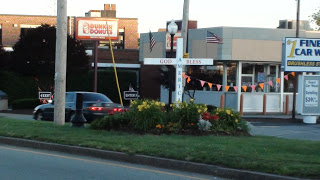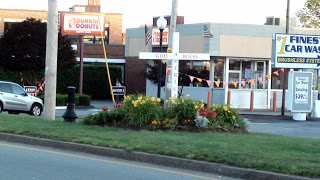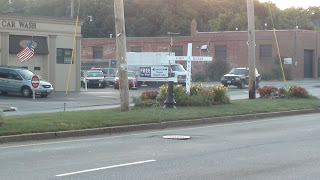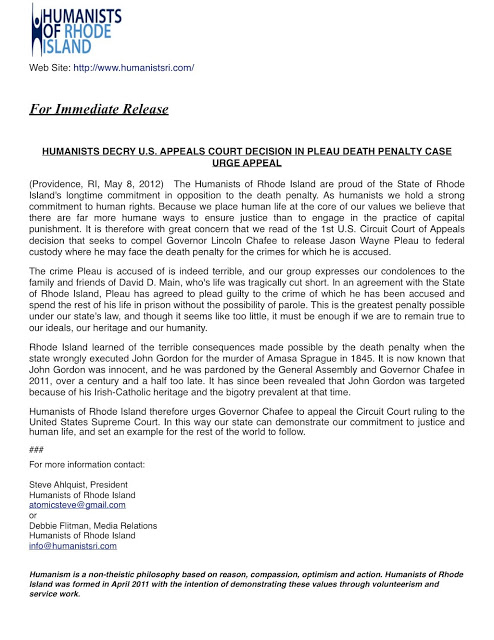Dear Mayor Fontaine,
As a citizen of Rhode Island with a keen interest in Establishment Clause jurisprudence, I am writing to urge you to keep the cross memorial as-is in front of the Woonsocket Fire Station. As this complaint from the Freedom From Religion Foundation comes on the heels of the Cranston School Prayer Banner case, it is no surprise that the Rhode Island community will make comparisons between the two displays. While I believed strongly that that the Prayer Banner was unconstitutional and advocated earnestly for its removal, I also believe that, due to the factual differences between these cases (namely that the Prayer Banner was in a public school, a setting that carries a different and stricter Establishment Clause case law), a comparison between the two is not apt and that the City of Woonsocket would be successful in any suit lodged against it.
The monument in this matter falls within the grey area of the Establishment Clause that is described by Justice Breyer in his concurring opinion in Van Orden v. Perry 545 U.S. 677 2005, which upheld a 10 Commandments monument on the grounds of the Texas State Capitol. While “the government must avoid excessive interference with, or promotion of, religion […] the Establishment Clause does not compel the government to purge from the public sphere all that in any way partakes of the religious. Such absolutism is not only inconsistent with our national traditions, but would also tend to promote the kind of social conflict the Establishment Clause seeks to avoid” (id., internal citations omitted). The factual record particular to this monument aligns closely with the Van Orden standard and this case would play a key role should the City decide to stand its ground and preserve this historical marker.
“Simply having religious content or promoting a message consistent with a religious doctrine does not run afoul of the Establishment Clause” Van Orden; rather, the alleged constitutional infraction must be viewed through the eyes of the reasonable observer, a fictional personage who “is the personification of a community ideal of reasonable behavior, determined by the collective social judgment, whose knowledge is not limited to information gleaned from viewing the challenged display, but extends to the general history of the place in which the display appears” Capitol Square Review Blvd. v. Pinette 515 U.S. 753 (1995). The reasonable observer here would see the monument knowing that it is nearly a century old, that it was erected in honor of Mr. William Jolicoeur who was killed in battle during World War I, that Mr. Jolicoeur was a member of the American Expeditionary Forces, and that “Historians and veterans regard the marker as a living link to Europe’s allies, especially France. At the close of World War I, Field Marshal Ferdinand Foch, the Supreme Commander of the Allied Forces, a Frenchman often called Europe’s counterpart to General Dwight Eisenhower, traveled to Woonsocket to dedicate the stone” (The Call, “Cross in Group’s Crosshairs,” 23 April 2012) and that the cross memorializing his death accords with his faith. In his Van Orden concurrence, Justice Breyer noted that “focusing on the text of the Commandments alone cannot conclusively resolve this case. Rather, to determine the message that the text here conveys, we must examine how the text is used. And that inquiry requires us to consider the context of the display” id. (BREYER, concurring). Seeing the cross alone outside of the corresponding monument on which it rests would be to ignore the guidance of the Supreme Court. The reasonable observer would see the cross and monument together as an honorable tribute to a specific Woonsocket citizen in keeping with his religious beliefs, not as a coercive message by a government intent on endorsing the Christian religion above all others. Additionally, in coming to his decision, Justice Breyer considered the environment in which the stone tablet was placed: “The physical setting of the monument, moreover, suggests little or nothing of the sacred. […] The setting does not readily lend itself to meditation or any other religious activity” id. Nor does the parking lot of a fire station.
While the age of a monument or practice cannot in and of itself cure what would otherwise be a constitutional infraction, it can still nonetheless be a vital factor in determining its constitutionality. “Standing alone, historical patterns cannot justify contemporary violations of constitutional guarantees, but there is far more here than simply historical patterns.” Marsh v. Chambers 463 U.S. 783 (1983). As Justice Breyer found regarding the Van Orden monument, “This display has stood apparently uncontested for nearly two generations. That experience helps us understand that as a practical matter of degree this display is unlikely to prove divisive. And this matter of degree is, I believe, critical in a borderline case such as this one” Van Orden (BREYER, concurring). The 10 Commandments tablet in question stood for 40 years before a suit was filed; the Woonsocket memorial has stood for 91. “Those [91] years suggest more strongly than can any set of formulaic tests that few individuals, whatever their belief systems, are likely to have understood the monument as amounting, in any significantly detrimental way, to a government effort to establish religion” id. The passage of time could not forgive an overtly coercive message by the government such as a banner entreating schoolchildren to pray to a “Heavenly Father.” But in regards to religious displays that have additional layers of meaning, such as the 10 Commandments (with its place within the context of the history of law and governance) or this memorial (the cross not serving a principal purpose of endorsing Christianity but of honoring a specific Christian soldier dear to this community), “those 40 years [regarding the 10 Commandments monument] suggest that the public visiting the capitol grounds has considered the religious aspect of the tablets’ message as part of what is a broader moral and historical message reflective of a cultural heritage” id. After 91 years, it is therefore this “broader moral and historical message” that dominates rather than a context of endorsing Christianity as the City’s preferred religion that one may glean from only a cursory viewing of the monument. The argument of the Freedom From Religion Foundation “fundamentally misunderstands the way monuments convey meaning. The meaning conveyed by a monument is not generally a simple one like ‘Beef: It’s what’s for dinner.’ Even when a monument features the written word, the monument may be intended to be interpreted, and may in fact be interpreted, by different observers, in a variety of ways” Pleasant Grove City, Utah v. Summum 555 U.S. 460 (2009) (internal citations omitted). To allow complainant’s simplistic interpretation of the monument (presumably: “Jesus: It’s what’s best for you.”) to dominate and control public policy would be to allow a “heckler’s veto,” whereby “an unwarranted extension of the Establishment Clause, an extension which would have the unfortunate effect of prohibiting a commendable patriotic observance,” would prevail. Elk Grove Unified School District v. Newdow 542 U.S. 1 (2004) (O’CONNOR, concurring).
In Salazar v. Buono 559 U.S. ___ (2010), the Supreme Court reversed a decision by the 9th Circuit Court of Appeals holding that a land-transfer statute passed by Congress to preserve a cross on federal property in the Mojave Desert was devoid of a secular basis and thus violative of the Establishment Clause. The Supreme Court, in remanding to the District Court with instruction to conduct a fact-finding inquiry in regards to the land transfer arrangement, expressed concern with the lower courts’ hastiness to label the cross as purely a government endorsement of Christianity. Justice Kennedy, writing for the majority, chastises the District Court:
By dismissing Congress’s motives as illicit, the District Court took insufficient account of the context in which the statute was enacted and the reasons for its passage. Private citizens put the cross on Sunrise Rock to commemorate American servicemen who had died in World War I. Although certainly a Christian symbol, the cross was not emplaced on Sunrise Rock to promote a Christian message. Placement of the cross on Government-owned land was not an attempt to set the imprimatur of the state on a particular creed. Rather, those who erected the cross intended simply to honor our Nation’s fallen soldiers. id. (internal citations omitted).
Similarly, the cross erected in front of the Woonsocket Fire Station was not “emplaced […] to promote a Christian message” but rather to honor a specific member of the community killed during World War I with respect to that person’s personal religious beliefs. Had Mr. Jolicoeur been Jewish, for example, and the City had tried to re-brand his memory as Christian, this action could be taken as illegal disapproval on behalf of the City for Judaism with accompanying favoritivism for Christianity. But this is not the case. Had the City erected a cross to memorialize all war dead regardless of their religious beliefs, this issue would be thornier (although still possibly winnable for the City). But again, this not the case. At one time, the City re-dedicated the memorial to honor the memory of three brothers killed in World War II. If the City were to make a habit of rededicating the monument whenever a Christian solider from the community died, ignoring Woonsocket soldiers of other religions, this would be seen as impermissible government endorsement of Christianity. But in having selected these four individuals to commemorate, the City did not necessarily show pro-Christian bias. Perhaps these four people had made particular contributions to Woonsocket in the past, or perhaps they were simply well-loved by their fellow Woonsocket citizens. Whatever the reason, the City did not create a constitutional issue in selecting certain people to memorialize but not others, for “a government entity has the right to ‘speak for itself ’ [and] ‘it is entitled to say what it wishes,’” so long of course, that it “comport[s] with the Establishment Clause” Pleasant Grove City (internal citations omitted).
Furthermore, throughout the majority decision and Justice Alito’s concurrence in Buono, the Court appears to be itching to declare the cross itself—not merely the land-transfer statute—constitutional under the Van Orden standard, an action precluded by the federal government’s decision to decline to petition for review by the Supreme Court on that matter. Justice Kennedy continues to upbraid the District Court in finding that it
concentrated solely on the religious aspects of the cross, divorced from its background and context. But a Latin cross is not merely a reaffirmation of Christian beliefs. It is a symbol often used to honor and respect those whose heroic acts, noble contributions, and patient striving help secure an honored place in history for this Nation and its people. Here, one Latin cross in the desert evokes far more than religion. It evokes thousands of small crosses in foreign fields marking the graves of Americans who fell in battles, battles whose tragedies are compounded if the fallen are forgotten. id.
Justice Alito chimes in, arguing that:
The cross is of course the preeminent symbol of Christianity, and Easter services have long been held on Sunrise Rock. But, as noted, the original reason for the placement of the cross was to commemorate American war dead and, particularly for those with searing memories of The Great War, the symbol that was selected, a plain unadorned white cross, no doubt evoked the unforgettable image of the white crosses, row on row, that marked the final resting places of so many American soldiers who fell in that conflict. […] If Congress had done nothing, the Government would have been required to take down the cross, which had stood on Sunrise Rock for nearly 70 years, and this removal would have been viewed by many as a sign of disrespect for the brave soldiers whom the cross was meant to honor. The demolition of this venerable if unsophisticated, monument would also have been interpreted by some as an arresting symbol of a Government that is not neutral but hostile on matters of religion and is bent on eliminating from all public places and symbols any trace of our country’s religious heritage. id. (ALITO, concurring).
Not only was the original reason for the placement of this cross to commemorate war dead, but to commemorate a specific soldier killed in World War I whose religion is easily verifiable. To remove this monument, whose primary purpose cannot be shown to promote Christianity to other people, 91 years after the fact, would be to show the callous hostility to “our country’s religious heritage” that the Supreme Court frowns upon.
There are, however, key factual differences between this and the Van Orden and Buono cases that need be addressed. In the Van Orden case, the 10 Commandments monument was donated by a private party whose contribution was clearly credited on the display, and was surrounded by various monuments donated by other groups that were accepted by the State of Texas on a religion-neutral basis. In the Buono case, the cross in question was erected by a group of private citizens. But this is not to say that the government can wash its hands of any illegal endorsement simply by turning a blind eye to residents who take it upon themselves to put up permanent religious monuments on government property. The government is accountable for the content of the monuments on its grounds:
Just as government-commissioned and government-financed monuments speak for the government, so do privately financed and donated monuments that the government accepts and displays to the public on government land. It certainly is not common for property owners to open up their property for the installation of permanent monuments that convey a message with which they do not wish to be associated. And because property owners typically do not permit the construction of such monuments on their land, persons who observe donated monuments routinely—and reasonably—interpret them as conveying some message on the property owner’s behalf. Pleasant Grove City.
That the Supreme Court upheld the 10 Commandments monument in Van Orden and appeared inclined to uphold the land transfer in Buono (an action which cannot ipso facto immunize an otherwise unconstitutional display), shows that the fact that private citizens contributed the Decalogue or cross did not dispositively determine the outcomes of these cases. Another difference is that in the Buono case, as stated above, Congress transferred the property containing the cross to private hands during the proceedings of that lawsuit. On the constitutionality of the cross itself as it stood on federally owned land, the 9th Circuit had the final word in finding the cross unconstitutional, because, as previously noted, the federal government did not pursue an appeal to the Supreme Court on that matter. However, the Supreme Court appears extremely critical of that decision and 9th Circuit decisions also set no binding precedent on Rhode Island, which is served by the 1st Circuit.
At first glance, this matter may seem similar to the circumstances surrounding the 10th Circuit Court of Appeals’ decision in American Atheists v. Utah Highway Patrol Association which held unconstitutional a series of roadside crosses to honor individual fallen state troopers. This decision sets no binding precedent in Rhode Island and should not even be considered influential on these proceedings. In this case, the State of Utah did not take into consideration the religious beliefs of the deceased troopers, but rather memorialized each of them with a cross with no policy in place to accommodate fallen troopers of other religions. In addition, the crosses were much larger and more obtrusive (being 12 feet tall), creating a chilling and alienating atmosphere for non-Christian residents who had to drive past cross after cross on their public highways. Plaintiffs also took quick action against the crosses: the community did not wait nearly a century to go by before mounting a challenge to them. The crosses thus did not have the historical significance that the Woonsocket monument possesses. As Justice Breyer clarifies in his Van Orden concurrence, comparing his decision to uphold that older monument while simultaneously deciding to strike down a newer 10 Commandments monument elsewhere: “in today’s world, in a Nation of so many different religious and comparable nonreligious fundamental beliefs, a more contemporary state effort to focus attention upon a religious text is certainly likely to prove divisive in a way that this longstanding, pre-existing monument has not” Van Orden (BREYER, concurring).
In short, this matter is worth pursuing. This monument is 91 years old. It asks no one to subscribe to any religious belief or participate in any religious activity. It shows no endorsement of religion, nor preference for religion over non-religion, as it sends no religious message other than the fact that the person it memorializes was Christian. Any interpretation of the monument that isolates the cross from the rest of the memorial does not place the display in its proper cultural and historic setting and thus will not be considered by a court of law. Removing this war monument now, nearly a century after its erection “could thereby create the very kind of religiously based divisiveness that the Establishment Clause seeks to avoid” Van Orden (BREYER, concurring). The separation of church and state is a principle that is fundamental to the fabric of our country, and a principle for which I have the utmost respect and admiration. I do not support the preservation of this monument despite the Establishment Clause, but rather because I do not see this as an Establishment Clause violation at all. “I recognize the danger of the slippery slope. Still, where the Establishment Clause is at issue, we must ‘distinguish between real threat and mere shadow.’ Here, we have only the shadow” id. (internal citations omitted).
The cross should stay.
